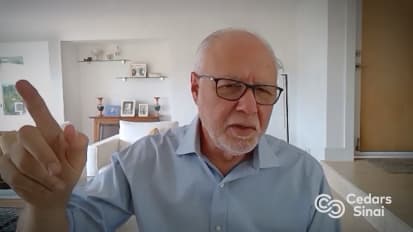Search Videos and More
 Video
Video
About the Diagnostic Radiology Residency Program
The Diagnostic Radiology Residency at Cedars-Sinai provides a 4-year academically and clinically oriented training program beginning at the second postgraduate year (PGY-2). The program is under the direction of Thomas J. Learch, MD, and is fully accredited by the American Board of Radiology. Video
Video
About the Cedars-Sinai Rheumatology Fellowship Program
The Cedars-Sinai Rheumatology Fellowship provides a diverse training experience in one of the most vibrant cities in the U.S. We train fellows to become knowledgeable and disciplined practitioners in rheumatic diseases, as well as critical thinkers, researchers and educators. News
News
European Heart Journal: Cell Infusions Benefit Heart Patients
Three years after the ALLSTAR clinical trial ended prematurely, the study's data shows that treatments of cardiosphere-derived cells -- the same cells used as an experimental therapy tested in COVID-19 patients -- demonstrated unexpected promise in heart attack survivors. Video
Video
The ALLSTAR Clinical Trial Explained
More than three years after a clinical trial was prematurely ended for failing to show progress in healing heart attack scars, a prominent peer-reviewed journal is publishing some surprising results showing that the heart cell treatment does benefit patients. Video
Video
Cedars-Sinai Opens New Samuel Oschin Cancer Center
Take a tour of the new Samuel Oschin Cancer Center, located on the 7th floor of the Pavilion building! We're confident this space will provide a restful and healing environment for patients fighting cancer. News
News
Cedars-Sinai Receives $25M to Create Karsh GI and Hepatology Division
A $25 million gift from Martha L. Karsh, Bruce A. Karsh and the Karsh Family Foundation will support innovative research and treatment of digestive and liver diseases. News
News
Cedars-Sinai, NIH to Test Bone Repair Technology
Cedars-Sinai and the National Center for Advancing Translational Sciences (NCATS) of the National Institutes of Health have agreed to collaborate on testing a technology designed to help the body regenerate bone to repair severe fractures. News
News
Cedars-Sinai and South Korea Organizations Sign Memorandum of Understanding
Cedars-Sinai faculty and South Korean healthcare and business leaders are launching a new partnership to advance the treatment of gastrointestinal cancers, which disproportionately affect Korean patients. News
News
Cedars-Sinai Named Age-Friendly Health System
New Programs Help Cedars-Sinai Address the Needs of Growing Population of Older Adults News
News
Cardiac Side Effects Found in 2 COVID-19 Drugs
About 12% of nearly 100 patients hospitalized with COVID-19 (coronavirus) developed a cardiac abnormality after receiving hydroxychloroquine and azithromycin—two drugs currently being administered to some coronavirus patients worldwide—according to an uncontrolled study reported May 28 by Cedars-Sinai in the Journal of the American Heart Association. News
News
Bairey Merz, MD, Wins Pioneer in Medicine Award
Noel Bairey Merz, MD, has a stellar academic background, including degrees from the University of Chicago and Harvard Medical School. But she jokes that she got a crucial boost in her pioneering research into women's heart disease by learning from someone with a different sort of pedigree. News
News
Grad Student is First Cedars-Sinai Gilliam Fellow
Cedars-Sinai Cancer is continuing to expand its robust clinical and investigative research staff with the addition of several new faculty scientists who bring a breadth of expertise to cancer patients.